Power distribution systems - Project examples
-
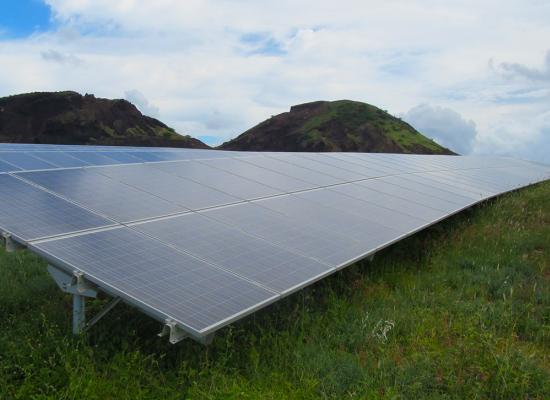
ECOWAS Region - Support to RE Flagship Projects
ECOWAS, the Economic Community of West African states, comprises 15 West African countries: Benin, Burkina Faso, Cabo Verde, Côte d'Ivoire, Gambia, Ghana, Guinea, Guinea-Bissau, Liberia, Mali, Niger, Nigeria, Senegal, Sierra Leone and Togo. The overall GIZ project supports the regional dissemination of experience concerning renewable energies and aims at improving the capacities of utilities in the long term.
Output Area B of the project "Generation - RE flagship projects" follows a two-pronged approach:
- Documentation of information on and experience with existing RE flagship projects;
- Support to the development of planned projects through technical assistance for project development and transaction advice, accompanied by documentation of experience.
intec's services
Provision and coordination of a pool of short-term experts to carry out the following tasks:
- Support to ECREEE in the process of screening, evaluating and prioritizing RE projects or promotion schemes
- Support to project developers and government representatives on technical, legal, financial and economic aspects of selected projects.
- Monitoring of selected projects during critical phases of their development and reporting of required action.
- Compilation of experiences with the selected projects and support to ECREEE / other institutions in the region in the dissemination of key findings and lessons learnt.
- Assistance to ECREEE and GIZ in supporting selected ECOWAS member states in creating an enabling legal, regulatory and administrative framework for grid-connected RE projects.
The above tasks cover PV, wind, small hydropower and biomass technology.
Client
ECREEE - ECOWAS Centre for Renewable Energy and Energy EfficiencyFinancing
Deutsche Gesellschaft für Internationale Zusammenarbeit (GIZ) GmbHPeriod of implementation
01.04.2015 - 15.12.2017 -
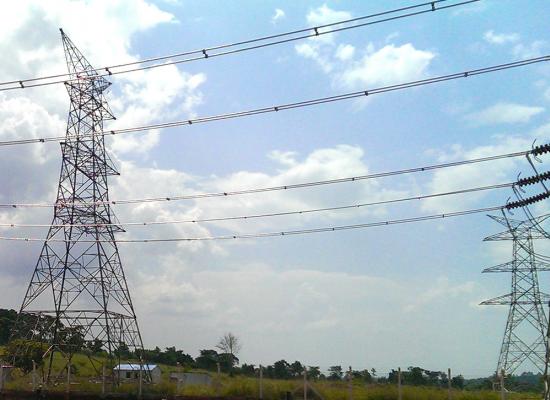
Uganda - Mutundwe - Entebbe 132 kV Power Transmission Line and Related Substation Works
The project scope comprises the following:
- Construction of approximately 36 km of double circuit 132 kV transmission line between Mutundwe Substation near Kampala City and Entebbe, partly with 4 circuits and with OPGW on one circuit.
- Extension of the existing 132/33/11 kV Mutundwe Substation (two outgoing 132 kV feeders, extension of busbar system; extension/modification of protection, control, telecommunication, and auxiliary AC/DC power supply systems; civil works).
- Entebbe Substation: Construction of a new outdoor 132/33 kV substation and 33 kV indoor switchgear (double busbar system, two incoming 132 kV line feeders, two 132/33 kV transformer bays with 50 MVA power transformers, one bus coupler bay, protection, control and SCADA, telecommunication and auxiliary power supply equipment, 33 kV indoor switchgear with two incoming and six outgoing feeders, a connection by 33 kV underground cable to the existing 33/11 kV distribution; control building, all related civil works).
intec's services
Project Design and Preparation of Tender Documents:
Review of the 2011 feasibility study report; review and adjustment of line route; pegging of angle towers; power system analysis with PSS/E; soil test report and project design report; elaboration of design and technical specifications for transmission line and substations; preparation of tender documents for EPC contracting.Assistance during the Tendering Stage:
Lead of pre-bid meeting and site visit with Bidders; Bidder's clarifications; bid evaluation; post-tender clarifications; preparation of evaluation report; assistance during contract negotiations; preparation of EPC contracts.Project Management and Construction Supervision:
Review and approval of design calculations and drawings; factory acceptance and site tests; supervision of works on site; monitoring of time schedule; project cost control; processing of contractors' invoices; monitoring of environmental management plan and of the adherence of the social impact assessment recommendations; enforcement of contractor's health; safety and environmental manual; witnessing of commissioning tests; preparation of commissioning protocol; punch list; preparation of final inspection and formal takeover; review of as-built drawings; preparation of project reports.Follow-up during the two-year Defects Liability Period (DLP).
Training of Client's Personnel:
On-the-job training of electrical and civil engineers on power system analysis and design, on the preparation of specifications for transmission lines and substations and on supervision of construction works; elaboration of a detailed training programme and delivery of a 3-week training session for Client's Engineers in the Consultant's home office.
Client
Uganda Electricity Transmission Company Ltd. (UETCL)Financing
Kreditanstalt für Wiederaufbau (KfW)Period of implementation
26.3.2014 - 30.11.2017 -
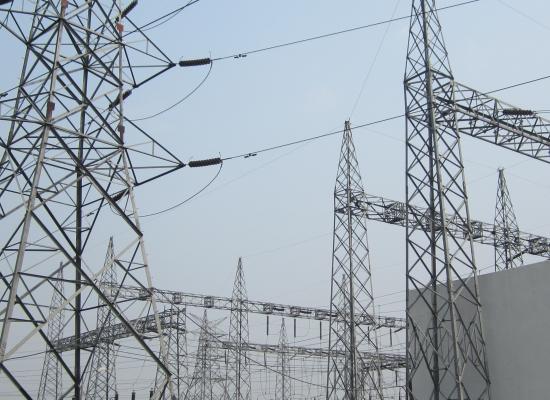
Bangladesh - Feasibility Study of the Transmission System Improvement, Western Zone
Bangladesh is facing chronic power shortage, with an estimated demand gap in the magnitude of 1900 MW and power outages in urban areas of between 5 to 10 hours a day. Taking into account the demand forecast, the current load shedding and the extreme power shortage and operational constraints, PGCB launched the "Power Transmission Improvement Programme" and approached the Government for external sector assistance.
The project covers the following technical measures:
- Construction of 132 kV double-circuit transmission lines and line in-/line outs to substations
- Stringing of a second circuit on an existing 132 kV line and installation of OPGW
- Construction of 230 kV double-circuit transmission lines and line-in/line-out to existing lines
- New construction of three 132/33 kV and one 230/132 kV substations
- Extension of a total of five 132/33 kV and one 230/132 kV substations (1 GIS substation)
intec's services
Feasibility study / technical and economic justification of the planned expansion measures, i.e.:
- network analysis and update of load flow calculations
- assessment of socio-economic benefits
- preliminary line route identification
- preliminary survey of substation areas
- layout and design on feasibility level for the 230 and 132 kV lines, substations and substation extensions
- identification of potential training needs in terms of O&M
- cost estimate, economic and financial analysis of planned measures
- Initial Environmental Examination (IEE) and mitigation measures
- detailed line route survey for 70 km of 230 d.c. line and a total of 85 km of 132 d.c. lines
- full ESIA for the selected technical measures to be implemented and Environmental and Social Management Plan (ESMP)
Tendering of resulting first-priority measures, i.e.:
- design and elaboration of technical specifications
- determination of the bills of quantities
- preparation of the tender dossiers (technical and commercial)
- assistance during tendering
- bid evaluation
- assistance during contract negotiations
for 6 different tender packages (3 substation packages and 3 transmission line packages).
Client
Power Grid Company of Bangladesh Ltd. (PGCB)Financing
KfW EntwicklungsbankPeriod of implementation
01.2014 - 07.2017
ECOWAS Region - Support to RE Flagship Projects
ECOWAS, the Economic Community of West African states, comprises 15 West African countries: Benin, Burkina Faso, Cabo Verde, Côte d'Ivoire, Gambia, Ghana, Guinea, Guinea-Bissau, Liberia, Mali, Niger, Nigeria, Senegal, Sierra Leone and Togo. The overall GIZ project supports the regional dissemination of experience concerning renewable energies and aims at improving the capacities of utilities in the long term.
Output Area B of the project "Generation - RE flagship projects" follows a two-pronged approach:
- Documentation of information on and experience with existing RE flagship projects;
- Support to the development of planned projects through technical assistance for project development and transaction advice, accompanied by documentation of experience.
intec's services
Provision and coordination of a pool of short-term experts to carry out the following tasks:
- Support to ECREEE in the process of screening, evaluating and prioritizing RE projects or promotion schemes
- Support to project developers and government representatives on technical, legal, financial and economic aspects of selected projects.
- Monitoring of selected projects during critical phases of their development and reporting of required action.
- Compilation of experiences with the selected projects and support to ECREEE / other institutions in the region in the dissemination of key findings and lessons learnt.
- Assistance to ECREEE and GIZ in supporting selected ECOWAS member states in creating an enabling legal, regulatory and administrative framework for grid-connected RE projects.
The above tasks cover PV, wind, small hydropower and biomass technology.
Client
ECREEE - ECOWAS Centre for Renewable Energy and Energy EfficiencyFinancing
Deutsche Gesellschaft für Internationale Zusammenarbeit (GIZ) GmbHPeriod of implementation
01.04.2015 - 15.12.2017Uganda - Mutundwe - Entebbe 132 kV Power Transmission Line and Related Substation Works
The project scope comprises the following:
- Construction of approximately 36 km of double circuit 132 kV transmission line between Mutundwe Substation near Kampala City and Entebbe, partly with 4 circuits and with OPGW on one circuit.
- Extension of the existing 132/33/11 kV Mutundwe Substation (two outgoing 132 kV feeders, extension of busbar system; extension/modification of protection, control, telecommunication, and auxiliary AC/DC power supply systems; civil works).
- Entebbe Substation: Construction of a new outdoor 132/33 kV substation and 33 kV indoor switchgear (double busbar system, two incoming 132 kV line feeders, two 132/33 kV transformer bays with 50 MVA power transformers, one bus coupler bay, protection, control and SCADA, telecommunication and auxiliary power supply equipment, 33 kV indoor switchgear with two incoming and six outgoing feeders, a connection by 33 kV underground cable to the existing 33/11 kV distribution; control building, all related civil works).
intec's services
Project Design and Preparation of Tender Documents:
Review of the 2011 feasibility study report; review and adjustment of line route; pegging of angle towers; power system analysis with PSS/E; soil test report and project design report; elaboration of design and technical specifications for transmission line and substations; preparation of tender documents for EPC contracting.
Assistance during the Tendering Stage:
Lead of pre-bid meeting and site visit with Bidders; Bidder's clarifications; bid evaluation; post-tender clarifications; preparation of evaluation report; assistance during contract negotiations; preparation of EPC contracts.
Project Management and Construction Supervision:
Review and approval of design calculations and drawings; factory acceptance and site tests; supervision of works on site; monitoring of time schedule; project cost control; processing of contractors' invoices; monitoring of environmental management plan and of the adherence of the social impact assessment recommendations; enforcement of contractor's health; safety and environmental manual; witnessing of commissioning tests; preparation of commissioning protocol; punch list; preparation of final inspection and formal takeover; review of as-built drawings; preparation of project reports.
Follow-up during the two-year Defects Liability Period (DLP).
Training of Client's Personnel:
On-the-job training of electrical and civil engineers on power system analysis and design, on the preparation of specifications for transmission lines and substations and on supervision of construction works; elaboration of a detailed training programme and delivery of a 3-week training session for Client's Engineers in the Consultant's home office.
Client
Uganda Electricity Transmission Company Ltd. (UETCL)Financing
Kreditanstalt für Wiederaufbau (KfW)Period of implementation
26.3.2014 - 30.11.2017Bangladesh - Feasibility Study of the Transmission System Improvement, Western Zone
Bangladesh is facing chronic power shortage, with an estimated demand gap in the magnitude of 1900 MW and power outages in urban areas of between 5 to 10 hours a day. Taking into account the demand forecast, the current load shedding and the extreme power shortage and operational constraints, PGCB launched the "Power Transmission Improvement Programme" and approached the Government for external sector assistance.
The project covers the following technical measures:
- Construction of 132 kV double-circuit transmission lines and line in-/line outs to substations
- Stringing of a second circuit on an existing 132 kV line and installation of OPGW
- Construction of 230 kV double-circuit transmission lines and line-in/line-out to existing lines
- New construction of three 132/33 kV and one 230/132 kV substations
- Extension of a total of five 132/33 kV and one 230/132 kV substations (1 GIS substation)
intec's services
Feasibility study / technical and economic justification of the planned expansion measures, i.e.:
- network analysis and update of load flow calculations
- assessment of socio-economic benefits
- preliminary line route identification
- preliminary survey of substation areas
- layout and design on feasibility level for the 230 and 132 kV lines, substations and substation extensions
- identification of potential training needs in terms of O&M
- cost estimate, economic and financial analysis of planned measures
- Initial Environmental Examination (IEE) and mitigation measures
- detailed line route survey for 70 km of 230 d.c. line and a total of 85 km of 132 d.c. lines
- full ESIA for the selected technical measures to be implemented and Environmental and Social Management Plan (ESMP)
Tendering of resulting first-priority measures, i.e.:
- design and elaboration of technical specifications
- determination of the bills of quantities
- preparation of the tender dossiers (technical and commercial)
- assistance during tendering
- bid evaluation
- assistance during contract negotiations
for 6 different tender packages (3 substation packages and 3 transmission line packages).
Client
Power Grid Company of Bangladesh Ltd. (PGCB)Financing
KfW EntwicklungsbankPeriod of implementation
01.2014 - 07.2017-
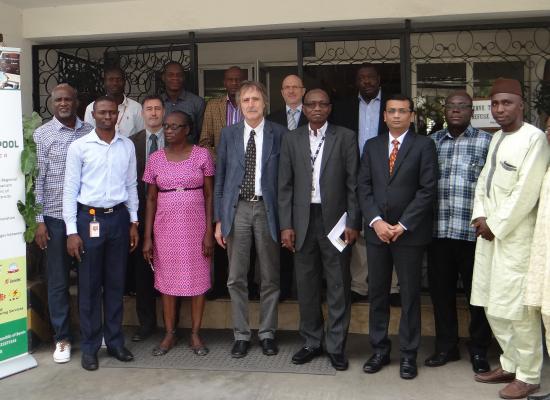
ECOWAS - Reduction of Distribution Losses in the Framework of the GIZ Project "Promoting a Climate-Friendly Interconnected Power System in West Africa"
ECOWAS, the Economic Community of West African states comprises 15 West African countries: Benin, Burkina Faso, Cabo Verde, Côte d'Ivoire, Gambia, Ghana, Guinea, Guinea-Bissau, Liberia, Mali, Niger, Nigeria, Senegal, Sierra Leone and Togo. The overall GIZ project supports the regional dissemination of experience concerning renewable energies and aims at improving the capacities of utilities in the long term. The "electricity distribution" part of the project, together with selected utilities, identifies options for the reduction of distribution losses, implements exemplary measures and disseminates the results in the region.
intec's services
- Task 1: Data collection, review and analysis of current situation in the member utilities: Diagnosis on the prac-tices of loss reduction, catalogue of good practices, proposal of related initiatives/projects for each utility, ex-amination of the adequacy of existing master plans in the distribution utilities and proposal of required updates including costs
- Task 2: Study to quantify system losses: Determination of loss levels by utility, estimate of share of technical losses, preparation of mitigation measures, review of / proposal for energy audit system for each utility, preparation of indicative plans and targets for capital expenditure to reduce overall losses possibly to below 10%
- Task 3: Loss reduction investment plans and cost estimates: development and recommendation of a comprehensive short- and long-term loss reduction investment plan including costs, recommendation of technical measures such as norms, standards and loss management guidelines
- Task 4: Training and capacity building: training needs assessment of utility staff, recommendations for capacity building programs in line with WAPP's capacity building program for member utilities and in coordination with GIZ's capacity building activities of the overall project.
Client
Deutsche Gesellschaft für Internationale Zusammenarbeit (GIZ) GmbHFinancing
Deutsche Gesellschaft für Internationale Zusammenarbeit (GIZ) GmbHPeriod of implementation
04.2015 - 07.2017 -
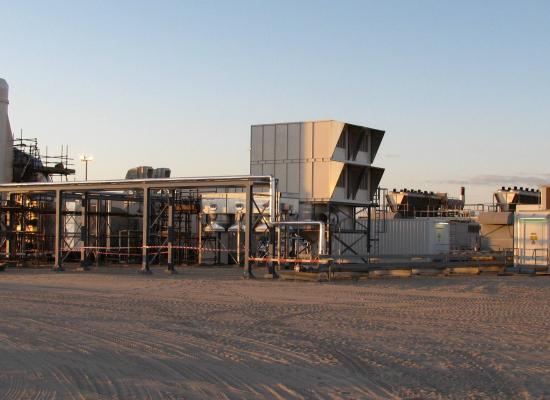
Mauritania - 50 MW Thermal Power Plant in Zouerate
SNIM (Société Nationale Industrielle et Minière) is a company that exploits the iron ore deposits around the mining city Zouerate, located in the Tiris Zemour region in the north of Mauritania. In order to cover its short-term electricity demand, M/s. SNIM commissioned TRACTEBEL ENGINEERING S.A. to carry out a feasibility study for a 50 MW thermal power plant in the city of Zouerate. The study on the generation units shall evaluate the following two variants:
- Conventional heavy fuel oil-fired generation units,
- Dual fuel generation units running on heavy fuel oil and natural gas.
Parts of the tasks under this feasibility study have been subcontracted to intec.
intec's services
intec contributed to the following tasks:
Phase 1: Analysis of the SNIM's electricity demand in the short, medium and long term, and definition of a medium and short-term supply strategy
- Site visit and data collection, assessment of existing studies
- Demand analysis and energy balance
Phase 2: Study of the technology variants and dimensioning of production units (preliminary design)
- Analysis of advantages and disadvantages of each variant
- Proposal for a choice of technology and its justification
- Optimisation of dimensioning of the generator units and cost estimates
Phase 3: Feasibility study for the chosen variant:
- Site selection and climatic conditions
- Optimisation of nominal capacity of the single production units and determination of principal technical specifications
- Stability and operation analysis of SNIM's electricity network
- Analysis of technical and economic feasibility of the project
Environmental and Social Impact Assessment (ESIA)
Geotechnical survey and laboratory analyses
Detailed design study and elaboration of tender documents.
Client
TRACTEBEL ENGINEERING S.A.Financing
TRACTEBEL ENGINEERING S.A.Period of implementation
08.2013 - 07.2016 -
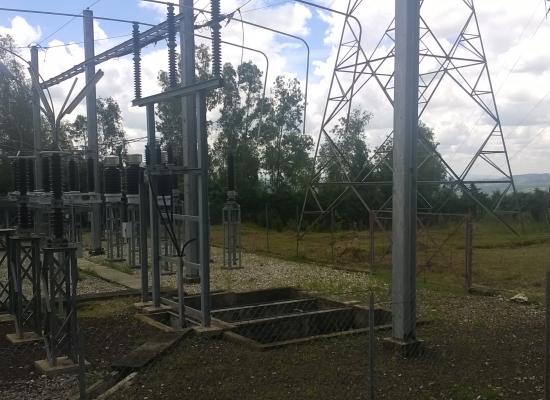
Rwanda, Burundi - Regional Interconnection Project (220 kV Transmission Line Kigoma - Butare - Ngozi - Gitega and 220/110 kV Substations)
The project was part of the NELSAP Regional Transmission Program that aimed at interconnecting five of the Nile Equatorial Lakes Countries, i.e. Burundi, DR Congo, Kenya, Rwanda and Uganda.
The project interconnected the electricity networks of Burundi and Rwanda through the construction of a new 220 kV single-circuit transmission line with a total length of 143 km. The line will initially be operated on the 110 kV level and might later be upgraded to 220 kV.
The project also included the construction of two new 220/110 kV substations, the extension of two existing 110 kV substations and the construction of 11.2 km of 30 kV line for rural electrification of Gisagara (Rwanda).
intec's services
- Review of existing feasibility studies
- Update of the Environmental and Social Management Plan (ESMP)
- Detailed design
- Preparation of complete tender documents for EPC Contractors (2 lots)
- Technical assistance during the procurement process, i.e. tendering, bid evaluation and contract award
- Preparation of a detailed Resettlement Action Plan (RAP) and monitoring of its implementation
- Design approval and supervision of implementation works
- Witnessing of factory acceptance tests, supervision of testing and commissioning
- Certification of Contractor's invoices and payments
- Monitoring and supervision of the implementation of the ESMP
- Safeguarding of project's compliance with KfW's and the World Bank's sustainability guidelines
- Technology transfer and training of employers' and project executing agency's staff
- Representation in the respective project steering and technical committees
Client
REGIDESO (Burundi), Energy Development Corporation Ltd. (Rwanda)Financing
KfW EntwicklungsbankPeriod of implementation
03.2015 - 06.2017
ECOWAS - Reduction of Distribution Losses in the Framework of the GIZ Project "Promoting a Climate-Friendly Interconnected Power System in West Africa"
ECOWAS, the Economic Community of West African states comprises 15 West African countries: Benin, Burkina Faso, Cabo Verde, Côte d'Ivoire, Gambia, Ghana, Guinea, Guinea-Bissau, Liberia, Mali, Niger, Nigeria, Senegal, Sierra Leone and Togo. The overall GIZ project supports the regional dissemination of experience concerning renewable energies and aims at improving the capacities of utilities in the long term. The "electricity distribution" part of the project, together with selected utilities, identifies options for the reduction of distribution losses, implements exemplary measures and disseminates the results in the region.
intec's services
- Task 1: Data collection, review and analysis of current situation in the member utilities: Diagnosis on the prac-tices of loss reduction, catalogue of good practices, proposal of related initiatives/projects for each utility, ex-amination of the adequacy of existing master plans in the distribution utilities and proposal of required updates including costs
- Task 2: Study to quantify system losses: Determination of loss levels by utility, estimate of share of technical losses, preparation of mitigation measures, review of / proposal for energy audit system for each utility, preparation of indicative plans and targets for capital expenditure to reduce overall losses possibly to below 10%
- Task 3: Loss reduction investment plans and cost estimates: development and recommendation of a comprehensive short- and long-term loss reduction investment plan including costs, recommendation of technical measures such as norms, standards and loss management guidelines
- Task 4: Training and capacity building: training needs assessment of utility staff, recommendations for capacity building programs in line with WAPP's capacity building program for member utilities and in coordination with GIZ's capacity building activities of the overall project.
Client
Deutsche Gesellschaft für Internationale Zusammenarbeit (GIZ) GmbHFinancing
Deutsche Gesellschaft für Internationale Zusammenarbeit (GIZ) GmbHPeriod of implementation
04.2015 - 07.2017Mauritania - 50 MW Thermal Power Plant in Zouerate
SNIM (Société Nationale Industrielle et Minière) is a company that exploits the iron ore deposits around the mining city Zouerate, located in the Tiris Zemour region in the north of Mauritania. In order to cover its short-term electricity demand, M/s. SNIM commissioned TRACTEBEL ENGINEERING S.A. to carry out a feasibility study for a 50 MW thermal power plant in the city of Zouerate. The study on the generation units shall evaluate the following two variants:
- Conventional heavy fuel oil-fired generation units,
- Dual fuel generation units running on heavy fuel oil and natural gas.
Parts of the tasks under this feasibility study have been subcontracted to intec.
intec's services
intec contributed to the following tasks:
Phase 1: Analysis of the SNIM's electricity demand in the short, medium and long term, and definition of a medium and short-term supply strategy
- Site visit and data collection, assessment of existing studies
- Demand analysis and energy balance
Phase 2: Study of the technology variants and dimensioning of production units (preliminary design)
- Analysis of advantages and disadvantages of each variant
- Proposal for a choice of technology and its justification
- Optimisation of dimensioning of the generator units and cost estimates
Phase 3: Feasibility study for the chosen variant:
- Site selection and climatic conditions
- Optimisation of nominal capacity of the single production units and determination of principal technical specifications
- Stability and operation analysis of SNIM's electricity network
- Analysis of technical and economic feasibility of the project
Environmental and Social Impact Assessment (ESIA)
Geotechnical survey and laboratory analyses
Detailed design study and elaboration of tender documents.
Client
TRACTEBEL ENGINEERING S.A.Financing
TRACTEBEL ENGINEERING S.A.Period of implementation
08.2013 - 07.2016Rwanda, Burundi - Regional Interconnection Project (220 kV Transmission Line Kigoma - Butare - Ngozi - Gitega and 220/110 kV Substations)
The project was part of the NELSAP Regional Transmission Program that aimed at interconnecting five of the Nile Equatorial Lakes Countries, i.e. Burundi, DR Congo, Kenya, Rwanda and Uganda.
The project interconnected the electricity networks of Burundi and Rwanda through the construction of a new 220 kV single-circuit transmission line with a total length of 143 km. The line will initially be operated on the 110 kV level and might later be upgraded to 220 kV.
The project also included the construction of two new 220/110 kV substations, the extension of two existing 110 kV substations and the construction of 11.2 km of 30 kV line for rural electrification of Gisagara (Rwanda).
intec's services
- Review of existing feasibility studies
- Update of the Environmental and Social Management Plan (ESMP)
- Detailed design
- Preparation of complete tender documents for EPC Contractors (2 lots)
- Technical assistance during the procurement process, i.e. tendering, bid evaluation and contract award
- Preparation of a detailed Resettlement Action Plan (RAP) and monitoring of its implementation
- Design approval and supervision of implementation works
- Witnessing of factory acceptance tests, supervision of testing and commissioning
- Certification of Contractor's invoices and payments
- Monitoring and supervision of the implementation of the ESMP
- Safeguarding of project's compliance with KfW's and the World Bank's sustainability guidelines
- Technology transfer and training of employers' and project executing agency's staff
- Representation in the respective project steering and technical committees
Client
REGIDESO (Burundi), Energy Development Corporation Ltd. (Rwanda)Financing
KfW EntwicklungsbankPeriod of implementation
03.2015 - 06.2017-
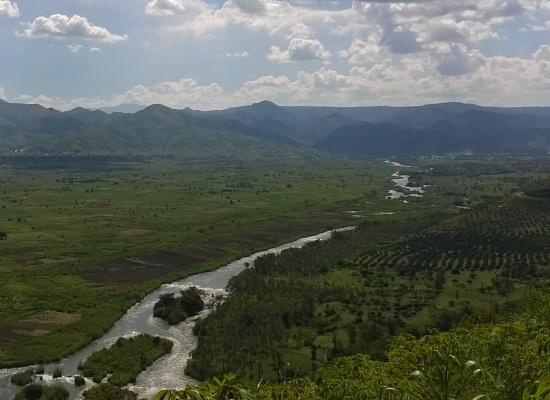
Congo (RD) - Revision of the Studies on the 220 kV Line Kamanyola - Buhandahanda
The 220 kV Kamanyola - Buhandahanda line shall evacuate the electricity generated by the Ruzizi III Hydropower Plant which is part of the 220 kV interconnected network of the CEPGL (Communauté Economique des Pays des Grands Lacs - Economic Community of the Great Lake Countries). Studies for this line were finalised in September 2011 and shall be revised under the present project with the aim to take into consideration the new locations of the Kamanyola and Buhandahanda Substations and the new line concept.
intec's services
- Review of the project's technical feasibility, in particular through revision of the line's general concept (review of the line route and harmonisation of the design (double-circuit line with possibly only one single circuit operated in the first phase), study of the grid stability with the new line, set-up of a simulation model of the interconnected network, power distribution and load flow studies, review of the line protection system)
- Review of the project's economic and financial feasibility (cost estimates, economic and financial viability, proposals for project financing and implementation)
- Preparation of the detailed design for the revised line concept, elaboration of the longitudinal profile on the basis of satellite data, and tower spotting
- Preparation of an Environmental and Social Impact Assessment (ESIA) and an Environmental Management Plan (EMP) in conformity with international standards, and elaboration of a Resettlement Action Plan (RAP)
- Elaboration of the tender dossier
- Organisation of a validation seminar with EGL, SNEL (National Power Company of Congo), the Steering Committee and KfW
- Participation in the project appraisal mission.
Client
Energie des Grands Lacs - EGLFinancing
KfW EntwicklungsbankPeriod of implementation
07.2015 - 03.2017 -
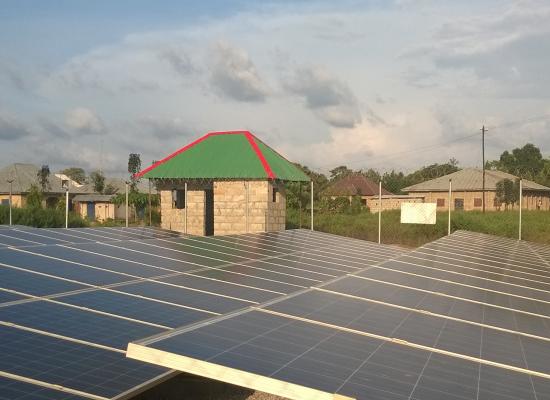
Nigeria - Grid-Connected Solar Power Plant (Feasibility Study & Pre-Feasibility Studies)
In its Roadmap for Power Sector Reforms (2013), Nigeria has articulated its commitment to accelerate economic growth while reducing its GHG emissions, i.a. by introducing renewables to the energy mix. The present project shall contribute to this goal. It includes the following main tasks:
- an in-depth feasibility study including power system integration studies for the development of a 50 MW solar plant at a single site in the State of Bauchi, allowing for modular scale-up and phased development, intended to lead to an investment bid;
- a pre-feasibility study on possible cogeneration feeder plants (20-50 MW) adjacent to existing and upcoming hydropower plants (e.g. Shiro-ro, Jebba, Kainji), grid-connected, centralized and/or distributed, in-tended to lead to functional bids;
- a pre-feasibility study on possible embedded generation plants within privatised DISCOs, grid-connected or distributed, intended to lead to functional bids;
- the preparation of tender documents for EPC;
- a training and capacity building programme.
intec's services
For all three studies, the scope of work includes i.a.:
- site identification and screening
- determination of solar resource
- selection of two best-ranked sites on the basis of technical-economic analyses
- investigation of grid integration and topographical issues
- preparation of an environmental and social management framework
- development of an investment plan
- elaboration of technical concept for the PV plant and the interconnection to the grid
- sensitivity analyses, commercial considerations
- determination of optimum plant sizes and potential for future expansion
- selection of highest-ranked sites and preparation of concept note and design, preliminary topographical survey and geotechnical investigation
In addition, the in-depth feasibility study for the investment bid includes the following services:
- preparation of concept design, drawings, cost estimate and implementation schedule
- comparison of off-take options (bulk trader or sale to DISCO) and feasibility of interconnection policies
- environmental scoping for the selected sites and preparation of ToR for a full ESIA
- preparation of complete tender documents for EPC
- preparation of a deployment and a marketing plan
The pre-feasibility scoping studies have the following additional deliverables:
- investor profiling and ranking, investment and development timelines
- preparation of business plans
- configuration and specification of respective projects and their justification, identification of key milestones, activities, potential partners, etc.
- indicative options for possible ownership and financing (third-party PPA, owner-operated, hybrid financing, capital lease arrangements, etc.)
The project also includes an extensive training, capacity building and dissemination programme, which includes inter alia:
- Seminars and workshops in Abuja on
PV technology, PV project planning in the Nigerian context
Economic and financial analysis of PV power plants
PV power plant basic design, technical specifications, tender documents and ESIA- A one-week study tour to Germany: visits to large-scale PV power plants, research facilities, a regional dispatch centre, a manufacturer of PV modules, project developers, EPC Contractors, etc.
- On-the-job training along all project activities.
Client
Federal Ministry of the Environment, Nigeria Erosion and Watershed Management Project (NEWMAP)Financing
World BankPeriod of implementation
03.2015 - 03.2017 -

Uganda - Interconnection Code & Wheeling Agreement
The preparation of an interconnection code and a wheeling agreement is part of the GET FiT Uganda Program, launched in May 2013 to promote private investment into renewable energy generation projects in Uganda.
The main purpose of program is to fast-track a portfolio of about 20-25 small-scale renewable energy generation projects (promoted by private developers with a total installed capacity of roughly 150 MW). The overall objective of the present assignment is to enable proper and full evacuation of embedded generators in the future, at allowable national and international techno-economic standards.
The project includes detailed technical and economic requirements for connecting generation facilities to the existing grid and will involve both interconnection and wheeling aspects.
For this purpose, the following work packages constitute the framework of the project:
Part A - Work Package 1: Interconnection and Grid Code for fluctuating renewable energy power integration into the grid
Part B - Work Package 2: Wheeling Agreement for fluctuating renewable energy power wheeling
Part C - Work Package 3: Knowledge Transfer Programme.
intec's services
- Development of an interconnection code for fluctuating renewable based power integration based on technical, legal and commercial issues
- Development of a wheeling agreement for wheeling of fluctuating renewable power according to the current policy and regulatory framework
- Development and test of a model for the computation of wheeling losses
- Proposal for wheeler's grid availability performance guarantees and penalty measures for non-compliance
- Development of a knowledge transfer program
- Conducting two workshops on interconnection and wheeling issues.
Client
Electricity Regulatory Authority (ERA)Financing
KfW EntwicklungsbankPeriod of implementation
05.2016 - 01.2017
Congo (RD) - Revision of the Studies on the 220 kV Line Kamanyola - Buhandahanda
The 220 kV Kamanyola - Buhandahanda line shall evacuate the electricity generated by the Ruzizi III Hydropower Plant which is part of the 220 kV interconnected network of the CEPGL (Communauté Economique des Pays des Grands Lacs - Economic Community of the Great Lake Countries). Studies for this line were finalised in September 2011 and shall be revised under the present project with the aim to take into consideration the new locations of the Kamanyola and Buhandahanda Substations and the new line concept.
intec's services
- Review of the project's technical feasibility, in particular through revision of the line's general concept (review of the line route and harmonisation of the design (double-circuit line with possibly only one single circuit operated in the first phase), study of the grid stability with the new line, set-up of a simulation model of the interconnected network, power distribution and load flow studies, review of the line protection system)
- Review of the project's economic and financial feasibility (cost estimates, economic and financial viability, proposals for project financing and implementation)
- Preparation of the detailed design for the revised line concept, elaboration of the longitudinal profile on the basis of satellite data, and tower spotting
- Preparation of an Environmental and Social Impact Assessment (ESIA) and an Environmental Management Plan (EMP) in conformity with international standards, and elaboration of a Resettlement Action Plan (RAP)
- Elaboration of the tender dossier
- Organisation of a validation seminar with EGL, SNEL (National Power Company of Congo), the Steering Committee and KfW
- Participation in the project appraisal mission.
Client
Energie des Grands Lacs - EGLFinancing
KfW EntwicklungsbankPeriod of implementation
07.2015 - 03.2017Nigeria - Grid-Connected Solar Power Plant (Feasibility Study & Pre-Feasibility Studies)
In its Roadmap for Power Sector Reforms (2013), Nigeria has articulated its commitment to accelerate economic growth while reducing its GHG emissions, i.a. by introducing renewables to the energy mix. The present project shall contribute to this goal. It includes the following main tasks:
- an in-depth feasibility study including power system integration studies for the development of a 50 MW solar plant at a single site in the State of Bauchi, allowing for modular scale-up and phased development, intended to lead to an investment bid;
- a pre-feasibility study on possible cogeneration feeder plants (20-50 MW) adjacent to existing and upcoming hydropower plants (e.g. Shiro-ro, Jebba, Kainji), grid-connected, centralized and/or distributed, in-tended to lead to functional bids;
- a pre-feasibility study on possible embedded generation plants within privatised DISCOs, grid-connected or distributed, intended to lead to functional bids;
- the preparation of tender documents for EPC;
- a training and capacity building programme.
intec's services
For all three studies, the scope of work includes i.a.:
- site identification and screening
- determination of solar resource
- selection of two best-ranked sites on the basis of technical-economic analyses
- investigation of grid integration and topographical issues
- preparation of an environmental and social management framework
- development of an investment plan
- elaboration of technical concept for the PV plant and the interconnection to the grid
- sensitivity analyses, commercial considerations
- determination of optimum plant sizes and potential for future expansion
- selection of highest-ranked sites and preparation of concept note and design, preliminary topographical survey and geotechnical investigation
In addition, the in-depth feasibility study for the investment bid includes the following services:
- preparation of concept design, drawings, cost estimate and implementation schedule
- comparison of off-take options (bulk trader or sale to DISCO) and feasibility of interconnection policies
- environmental scoping for the selected sites and preparation of ToR for a full ESIA
- preparation of complete tender documents for EPC
- preparation of a deployment and a marketing plan
The pre-feasibility scoping studies have the following additional deliverables:
- investor profiling and ranking, investment and development timelines
- preparation of business plans
- configuration and specification of respective projects and their justification, identification of key milestones, activities, potential partners, etc.
- indicative options for possible ownership and financing (third-party PPA, owner-operated, hybrid financing, capital lease arrangements, etc.)
The project also includes an extensive training, capacity building and dissemination programme, which includes inter alia:
- Seminars and workshops in Abuja on
PV technology, PV project planning in the Nigerian context
Economic and financial analysis of PV power plants
PV power plant basic design, technical specifications, tender documents and ESIA
- A one-week study tour to Germany: visits to large-scale PV power plants, research facilities, a regional dispatch centre, a manufacturer of PV modules, project developers, EPC Contractors, etc.
- On-the-job training along all project activities.
Client
Federal Ministry of the Environment, Nigeria Erosion and Watershed Management Project (NEWMAP)Financing
World BankPeriod of implementation
03.2015 - 03.2017Uganda - Interconnection Code & Wheeling Agreement
The preparation of an interconnection code and a wheeling agreement is part of the GET FiT Uganda Program, launched in May 2013 to promote private investment into renewable energy generation projects in Uganda.
The main purpose of program is to fast-track a portfolio of about 20-25 small-scale renewable energy generation projects (promoted by private developers with a total installed capacity of roughly 150 MW). The overall objective of the present assignment is to enable proper and full evacuation of embedded generators in the future, at allowable national and international techno-economic standards.
The project includes detailed technical and economic requirements for connecting generation facilities to the existing grid and will involve both interconnection and wheeling aspects.
For this purpose, the following work packages constitute the framework of the project:
Part A - Work Package 1: Interconnection and Grid Code for fluctuating renewable energy power integration into the grid
Part B - Work Package 2: Wheeling Agreement for fluctuating renewable energy power wheeling
Part C - Work Package 3: Knowledge Transfer Programme.
intec's services
- Development of an interconnection code for fluctuating renewable based power integration based on technical, legal and commercial issues
- Development of a wheeling agreement for wheeling of fluctuating renewable power according to the current policy and regulatory framework
- Development and test of a model for the computation of wheeling losses
- Proposal for wheeler's grid availability performance guarantees and penalty measures for non-compliance
- Development of a knowledge transfer program
- Conducting two workshops on interconnection and wheeling issues.






